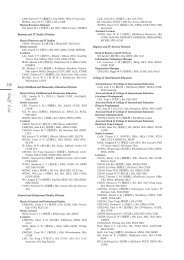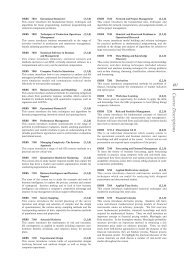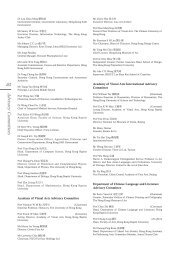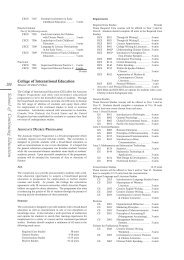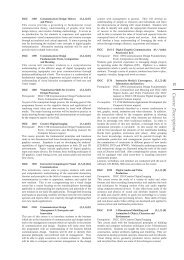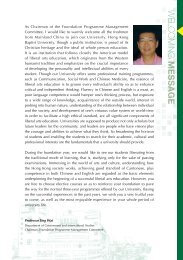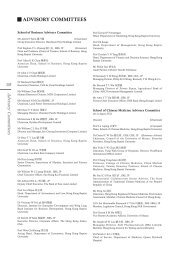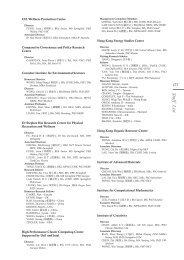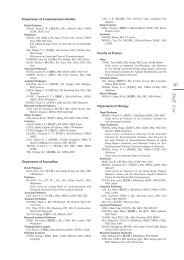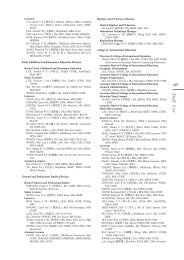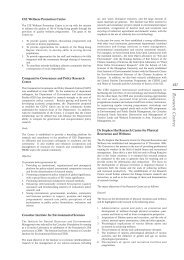380<strong>Course</strong> <strong>Descriptions</strong>GEOG 4005 Advanced Climatology (3,3,0)Prerequisite: GEOG 2016 Earth System: Atmosphere andBiosphere or consent of the instructorThis course introduces selected scopes of climatology. Theyinclude an introduction to synoptic climatological methods andapplications, with particular emphasis on the climate of China,climate change and climate modelling, and a comprehensiveintroduction to applied climatology.GEOG 4006 Advanced Quantitative Methods (3,2,1)in GeographyPrerequisite: GEOG 2007 Introduction to Quantitative Methodsin Geography or consent of the instructorThis course teaches students the application of quantitativemethods to geographic problem solving. Statistical methods thatare commonly used in geography studies and spatial analysismethods are introduced. Emphasis is placed on the applicationof analytical tools to real-world geographic problems andinterpretation of analysis results. The course also teaches studentsone of the most widely used statistical software programmesfor social sciences-SPSS. Topics include Analysis of Variance(ANOVA), regression models, factor analysis, spatial patternanalysis and cluster analysis, etc.GEOG 4007 Applied Geomorphology (3,2,1) (E)The course develops a student’s knowledge and understandingof modem earth surface processes and landscape development.Emphasis is placed on human impacts on the natural landscapeof <strong>Hong</strong> <strong>Kong</strong>. Special attention is given to methods ofmeasurement, monitoring and interpretation of collected datafrom various natural environments. Fieldwork is an essentialcomponent.GEOG 4015 Costal Environments and (3,2,1)ProcessesMuch of the territorial area of <strong>Hong</strong> <strong>Kong</strong> and southern Chinalies below sea level, yet few people are fully aware of how coastalprocesses operate or what marine resources and problems exist.This course will familiarise students with the processes thatdominate local marine settings and introduces them to majorcoastal environments, especially in the <strong>Hong</strong> <strong>Kong</strong> region.GEOG 4016 Energy Development in China (3,3,0)Prerequisite: G E O G 3 0 0 7 E n e r g y P r o b l e m s a n d t h eEnvironment or consent of the instructorEnergy used to be a serious bottleneck in the economicdevelopment of China in the 1980s when the country first openedup to the outside world. In the past three decades, momentouschanges occurred in the Chinese energy sector, including changesin the institutional framework—moving from state allocationto the market economy—and with respect to individual energyindustries. By the mid-1990s, the problem of energy shortage hadlargely been resolved (which re-appeared in another form lately),yet the country has become a net oil importer, and is projected toimport an increasingly larger amount in the future, with seriousimplications for the security of energy supply and future oilimport outlay. The course takes a comprehensive survey of theChinese energy sector, including the resource endowment, energypolicy since the 1980s, the major energy industries like oil, coal,natural gas, electricity—HEP and nuclear included—and theinternational energy trade of China. Current issues such as theWest–East Pipeline and looming energy security issues are alsodealt with.GEOG 4017 Geographical Information (3,2,2)SystemsPrerequisite: GEOG 2015 CartographyGeographical Information System (GIS) is an information systemthat is specially designed for handling spatial (or geographical)data. It combines a set of interrelated sub-systems that create,edit, manipulate, analyse and display data both in text and graphicforms. GIS supports spatial analysis and modelling within thediscipline of geography (e.g. location, proximity, and spatialdistribution), making it a vital tool for modern geography.GEOG 4025 Geographical Imaginations (3,2,1) (E)This course introduces geography students to the majorphilosophical and methodological discussions in the field. “Whatdo geographers do?”, “how do they differ from other socialscientists such as economists and sociologists?” and “how aregeography works influenced by different schools of philosophicalthought?” This course attempts to answer these questions byinvestigating the main trends in Western geographic thinking sincethe 20th century. Also, a brief introduction to Chinese geographicthought is provided.GEOG 4026 Geography of Economic (3,3,0)DevelopmentThis course provides an in-depth understanding on developmentissues. A variety of theories and strategies on economicdevelopment are investigated. Special emphasis is given to thedevelopment experience of Asian countries, in particular <strong>Hong</strong><strong>Kong</strong>, Singapore and South Korea. The notion of globalizationand its impact on regional economic development will beexamined.GEOG 4027 Geography of Environmental (3,3,0) (E)HazardsEnvironmental hazards such as earthquakes, volcanic eruptions,flooding, landslides, typhoons and air/water pollution have a hugeimpact on our lives and, with a growing world population, thereis an increasing need to understand how these hazards can bereduced. This course introduces environmental hazard researchin a geographical context. The course provides a comprehensiveintroduction to the causes of climatic and geological hazardsand environmental health hazards, and human responses andadjustments.GEOG 4035 Geography of Transportation (3,2,1) (E)This is an introductory course on transportation geography. Itfirst introduces the economical and spatial concepts underlyingtransportation geography and transportation systems. Next, thedevelopment history and experience of China’s transportationsystems will be outlined and discussed. Basic concepts oflogistics and geography will be introduced and form the basisfor discussion of <strong>Hong</strong> <strong>Kong</strong> as a transportation hub. This isfollowed by the introduction of two important transportationanalysis methods: spatial interaction and network analysis. Next,characteristics of urban travel and problems related to urbantransportation are outlined. The final module of the course dealswith the externalities of transportation activities in the context ofsustainable transportation and policies that may mitigate trafficcongestion and meet the objective of sustainable development.GEOG 4036 Political Geography (3,3,0)This course examines how geographical factors affect politicalorganization at the national and international level. The effects ofgeographic elements such as territory, population, boundaries, anddistance from the sea are covered, followed by a treatment of thecapital, the core area of a state, selection of a unitary or federalform of government, emergence of the Third World followingthe dismemberment of the colonial empires, supra-nationalorganizations, and the complex issues involved in the law of thesea treaty. Moreover, certain major theories in political geographyand globalization are presented.GEOG 4037 Population Geography of China (3,2,1)Prerequisite: GEOG 3025 Population Geography or consent ofthe instructorThis course provides an in-depth analysis of China’s populationfrom a spatial point of view. Specifically the course will examinethe integration of population planning in socialist China and itsrelationship with the four modernizations.GEOG 4045 Problems in the Physical (3,3,0)Geography of ChinaPrerequisite: GEOG 3006 or CHSG 3006 Regional Geographyof ChinaThis course presents an examination of how the various physical
processes interact with China’s socio-political milieu to affectthe current physical landscapes and the kinds of environmentalproblems that the country has to face. This involves a problemorientedapproach, with a view to improving the sustainability ofChina’s physical/environmental system.GEOG 4046 Remote Sensing and Image (3,2,2) (E)InterpretationRemote sensing is defined as the science and art of acquiringinformation about material objects without being in touch withthem. These measurements are possible with advanced airborneand space-borne remote sensing platforms and sensors that arecapable of observing any part of the world frequently with variousdetails. It is discovered that each earth cover has its own spectralreflectance characteristics. The characteristics are so unique thatthey are called “signature” which enable us to discern the objectsfrom its intermixed background. The final remote sensing processis completed by the analysis of the data using image interpretationand image processing techniques. Some key elements, or cuesfrom the imagery, such as shape, size, pattern, tone or colour,shadow and association, are used to identify a variety offeatures on earth. The techniques of image interpretation canbe further enhanced by the techniques of image processing thatcan restore, enhance and extract geographical information fromoriginal remote sensing images. These altogether yield valuableinformation on earth resources and living environment of humanbeings.GEOG 4047 Resource Management in China (3,2,1) (P)This course introduces the concepts, knowledge and skills innatural resource evaluation and management, with the emphasisthe real-world cases in China. The course is presented in twomajor parts. The first part begins with the introduction to theconcepts about the natural resources and their distribution inChina. This is followed by an extensive study on methodologyfor land and water resource evaluation. The second part presentsdetails about the nature, distribution and utilisation of naturalresources in China. Environmental conservation and sustainabledevelopment in relation to natural resources are also discussed.Laboratory work for this course focus on resource assessmentmethods with the aid of remote sensing and geographicalinformation system (GIS) technology.GEOG 4055 Rural and Agricultural (3,2,1)Development in ChinaThis course employs a geographical perspective to investigateissues concerning rural and agricultural development incontemporary China. Focus is put on the social and economicspheres and how the dynamics of change since 1978 have affectedthese spaces. A variety of spatial variations on developmentexperiences are investigated to show how space makes adifference.GEOG 4056 Selected Topics in the Geography (3,3,0)of China (Human Geography)This course involves an in-depth study of selected issues in thecontemporary geography of China. The major socio-economictopics or physical/environmental topics to be discussed have beenintentionally designed to be flexible.GEOG 4057 Selected Topics in the Geography (3,3,0)of China (Physical and EnvironmentalGeography)This course involves an in-depth study of selected issues in thecontemporary geography of China. The major socio-economictopics or physical/environmental topics to be discussed have beenintentionally designed to be flexible.GEOG 4065 Energy Policy and Analysis (3,3,0)Prerequisite: G E O G 3 0 0 7 E n e r g y P r o b l e m s a n d t h eEnvironment or consent of the instructorPartly built upon GEOG 3007 Energy Problems and theEnvironment, this course focuses on the construction ofnational energy policies. Apart from the factors discussed in theprevious subject, other factors that affect the formulation of anational energy policy are treated, including pattern of sectoralconsumption of energy, energy intensiveness of economy,pollution problems of energy and the role of the non-conventionalsources such as wind, solar and geothermal energy. Case studiesof energy policies of selected Asian countries are covered,together with substantial research on an energy topic.GEOG 4066 Seminar in Environmental (3,3,0)Planning and ManagementPrerequisite: GEOG 3017 Global Environmental Issues andSustainability; GEOG 3007 Energy Problemsand the Environment; GEOG 3015 Geographyof Health and the Environment or consent of theinstructorThis course starts with a comprehensive introduction to themajor principles and approaches of environmental planningand management. This is followed by in-depth analysis ofseveral classical local environmental planning and managementcases. The final part of this course will focus on the greenurbanism theme by discussing how environmental planning andmanagement profession can help to develop a sustainable lowcarbon city.GEOG 4067 Seminar in Social Geography (3,3,0)This course is concerned with the understanding of the cause andeffect of how social groups and other social phenomena (such associal services, crime and delinquency, and housing provision)are distributed, especially in the urban context. The coursefocuses on interactions, positive or negative, beneficial or harmful,constructive or destructive.GEOG 4075 Seminar in Urban Geography (3,3,0)Prerequisite: GEOG 3027 Urban GeorgraphyThis course discusses in depth selected topics of major concern inthe Urban Geography and Urban Studies literature. The contentsof the course vary from year to year, depending on the currentresearch focus of the instructor. Possible topics to be examinedincluded globalization, world cities and mega-urban regions,housing, inequality and residential differentiation, urban politicsand conflict resolution, and new urbanism and sustainable urbandevelopment.GEOG 4076 Urban Cultural Landscape (3,3,0) (E)This course looks into the urban landscape, specifically (1) itsformation and evolution with time and space, (2) its symbolicmeanings and effects on urban living, as well as (3) issues inrelation to its planning and design.GEOG 4077 Urban Development and Planning (3,2,1) (E)in <strong>Hong</strong> <strong>Kong</strong>Urban <strong>Hong</strong> <strong>Kong</strong> has developed rapidly since the 1950s. Thebuilt environment has expanded from one concentrated on twosides of the Victoria Harbour to one encroaching into the NewTerritories and even spreading across the boundary to Shenzhen.What are the salient features of this urban development, bothin the inner city and at the periphery? Is it business-biased? Isit over-dominated by the property sector? How to interpret itsgrowth pattern and dynamics? What is the role of the <strong>Hong</strong> <strong>Kong</strong>Government? What is urban planning? This course will be ofinterest to anyone who dares to know more about urban <strong>Hong</strong><strong>Kong</strong> and develop an urban model within the broader contexts ofChina, Asia and the West.GEOG 4085 Urban Development in China (3,3,0)Prerequisite: GEOG 3006 or CHSG 3006 Regional Geographyof China or consent of the instructorThis course introduces students to China’s immense urbantransformation process. The course is divided into threeparts. Part A briefly reviews the urbanization process. It dealswith questions such as the nature of the urbanization processbefore and after reform, and the question of hukou and rural tourban migration. Part B is on the internal structure of Chinesecities, focusing on urban land development. China’s changing381<strong>Course</strong> <strong>Descriptions</strong>
- Page 3 and 4:
economic growth, trade, pollution,
- Page 5 and 6:
specific empirical economic problem
- Page 7 and 8:
of private enterprises in the indus
- Page 9 and 10:
period. The first part of the cours
- Page 11 and 12:
The reactions and effectiveness of
- Page 14:
314Course DescriptionsEDUC 3080 Tea
- Page 17 and 18:
development of children and adolesc
- Page 19 and 20:
and communication skills in differe
- Page 21 and 22:
y ubiquitous technology. Learners w
- Page 23 and 24:
ENG 2650 Topics in English Grammar
- Page 25 and 26:
clause structures of the English la
- Page 27 and 28:
adopted for reading and interpretin
- Page 29 and 30: drama; and (2) introduce Western dr
- Page 31 and 32: ENGL 4005 Advanced Topic in Compara
- Page 33 and 34: attendant to the break-up of mediev
- Page 35 and 36: EURO 3205 Comparative Politics of (
- Page 37 and 38: states, enlargement provides signif
- Page 39 and 40: to create and develop ideas via rel
- Page 41 and 42: strategies of awarded campaigns to
- Page 43 and 44: characteristics of films, film-make
- Page 46: 346Course DescriptionsFINE 1005 Fin
- Page 49 and 50: GCHC 1005 China and the Global Econ
- Page 51 and 52: the period with a special focus on
- Page 53 and 54: est decision-making procedures. Mor
- Page 55 and 56: GCPE 1065 Table Tennis (1,2,0) (C)T
- Page 57 and 58: and/or philosophical traditions the
- Page 59 and 60: on the use of English in various se
- Page 61 and 62: GDAR 1835 Music, Mind, and Human (3
- Page 63 and 64: lead to successful development of n
- Page 65 and 66: management and proactive stakeholde
- Page 67 and 68: GDCV 1065 Buildings of Hong Kong: (
- Page 69 and 70: of various religions that broaden t
- Page 71 and 72: their implications for contemporary
- Page 73 and 74: gone through since 1945 included th
- Page 75 and 76: GEOG 1005 Geography and the Contemp
- Page 77 and 78: students to the concepts and techni
- Page 79: GEOG 3730 Energy Policy and Analysi
- Page 83 and 84: GERM 1006 German II (3,3,0) (G)Prer



